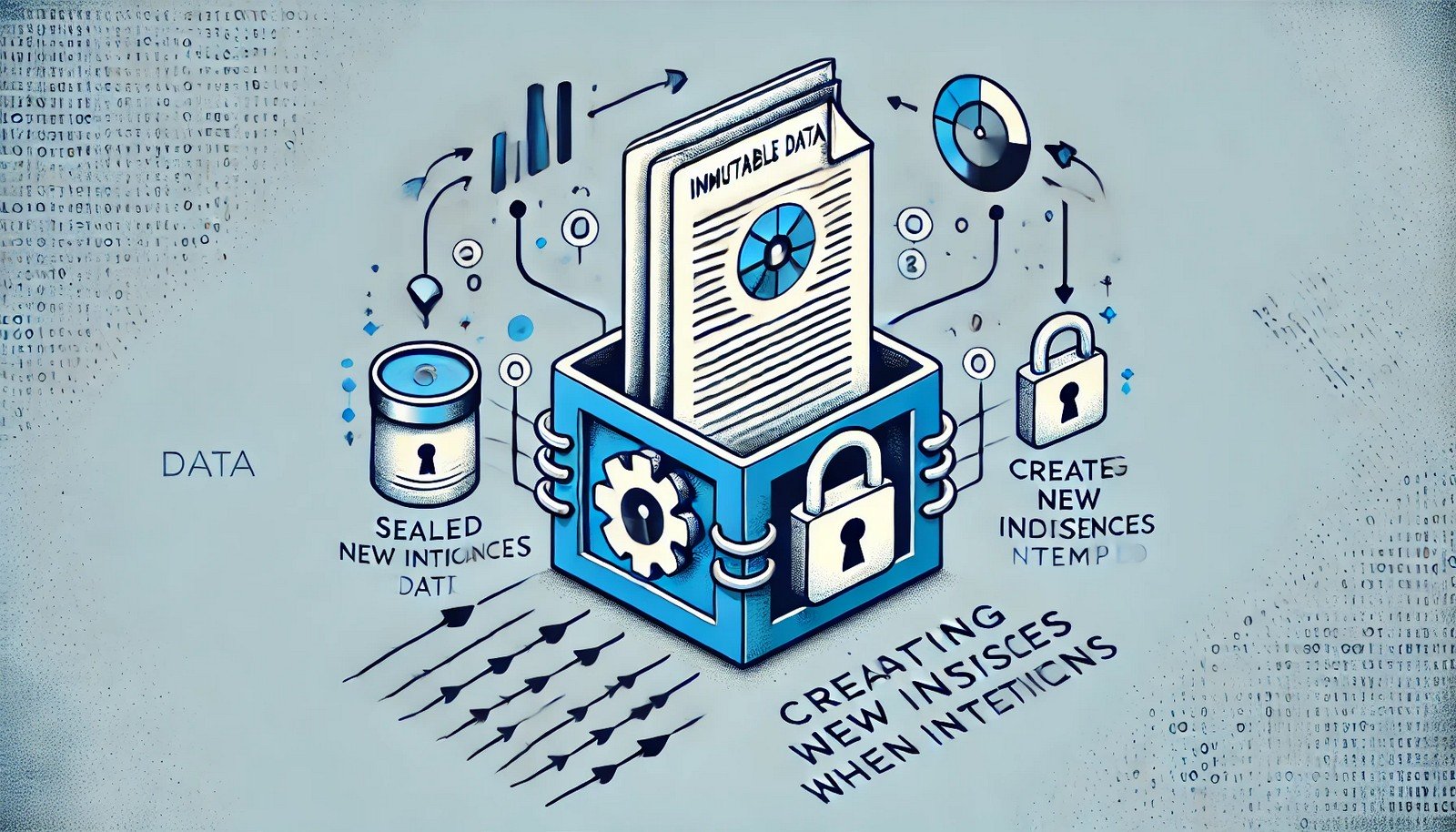Immutable Data
 (Representational Image | Source: Dall-E)
(Representational Image | Source: Dall-E)
Quick Navigation:
- Immutable Data Definition
- Immutable Data Explained Easy
- Immutable Data Origin
- Immutable Data Etymology
- Immutable Data Usage Trends
- Immutable Data Usage
- Immutable Data Examples in Context
- Immutable Data FAQ
- Immutable Data Related Words
Immutable Data Definition
Immutable data refers to data that, once created, cannot be altered or modified. Instead, any attempt to change it results in the creation of a new data instance. This characteristic makes immutable data a key concept in functional programming, database management, and distributed systems. Immutable structures improve predictability, simplify debugging, and enhance concurrency in multi-threaded environments. Popular programming languages like JavaScript, Python, and Clojure leverage immutable data structures to improve software performance and reliability.
Immutable Data Explained Easy
Think of immutable data like a drawing you made with a marker. You can’t erase or change it once it’s done; you’d need a new piece of paper to draw something different. Computers use immutable data similarly to keep things organized and prevent confusion, like making sure two kids don’t accidentally change each other’s homework!
Immutable Data Origin
The concept of immutability originates from mathematics and functional programming, where values and states are often treated as unchangeable to ensure consistency. The rise of parallel computing and distributed systems emphasized immutability's importance in simplifying complex data management tasks.
Immutable Data Etymology
The term “immutable” comes from the Latin word “immutabilis,” meaning “unchangeable” or “unalterable.”
Immutable Data Usage Trends
Immutable data structures have gained significant attention with the growth of functional programming languages and frameworks. Modern software development tools and libraries like React and Redux heavily advocate for immutability due to its benefits in reducing side effects, improving state management, and enabling robust testing practices.
Immutable Data Usage
- Formal/Technical Tagging:
- Functional Programming
- Data Structures
- State Management - Typical Collocations:
- "immutable object"
- "immutable list"
- "immutable state"
- "data immutability in programming"
Immutable Data Examples in Context
- A Redux state in a React application remains immutable to ensure predictable UI behavior.
- Immutable objects in Java’s `Collections` framework prevent accidental data modifications.
- Immutable data structures in Python, like tuples, are used to create reliable data pipelines.
Immutable Data FAQ
- What is immutable data?
Immutable data refers to data that cannot be changed after creation. - Why is immutability important in programming?
It helps prevent unintended side effects and simplifies debugging and testing. - How is immutable data implemented?
By using structures like immutable lists or tuples and avoiding in-place modifications. - What programming languages support immutability?
Languages like Python, JavaScript, Scala, and Clojure promote immutability. - Can immutable data improve application performance?
Yes, particularly in concurrent systems by avoiding conflicts between threads. - What is the difference between mutable and immutable data?
Mutable data can be changed after creation, while immutable data cannot. - How is immutable data used in databases?
It ensures data integrity by maintaining history and avoiding overwrites. - What are common examples of immutable data in Python?
Tuples, frozensets, and strings are immutable. - Is immutability always beneficial?
While useful, immutability can increase memory usage in some cases. - How does immutability help in distributed systems?
Immutable data reduces synchronization issues and ensures consistency.
Immutable Data Related Words
- Categories/Topics:
- Functional Programming
- Software Development
- Data Management
Did you know?
The concept of immutable data inspired the development of blockchain technology, where each block is an immutable record. This immutability ensures security and trust in cryptocurrency transactions and decentralized applications.
PicDictionary.com is an online dictionary in pictures. If you have questions or suggestions, please reach out to us on WhatsApp or Twitter.Authors | Arjun Vishnu | @ArjunAndVishnu

I am Vishnu. I like AI, Linux, Single Board Computers, and Cloud Computing. I create the web & video content, and I also write for popular websites.
My younger brother, Arjun handles image & video editing. Together, we run a YouTube Channel that's focused on reviewing gadgets and explaining technology.



Comments powered by CComment